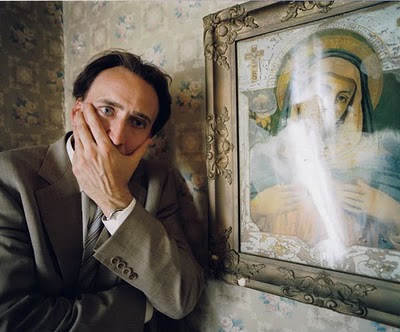You don’t need to have seen The Bad Lieutenant to enjoy its sequel, Port of Call: New Orleans. In fact, it’s probably better to enjoy the second film on its own merits, and then rent the original if you’re curious. You see, Port of Call is not only a perfect sequel; it’s a nearly perfect movie.
In 1992, star Harvey Keitel and director Abel Ferrara delivered a bleak portrait of unchecked power, corruption, and addiction. Keitel played the titular dirty cop investigating the rape of a New York nun. The movie didn’t have a plot so much as an inevitable downward trajectory, as its main character sunk into gambling debt, had threesomes with hookers, and absorbed every kind of vice imaginable. By the time he’d coaxed two teenager girls into watching him masturbate, you’d either turned the movie off, or you couldn’t turn away. Keitel gave an honest, compelling performance of a lost soul, and his ultimate redemption was both touching and tragic.
Flash forward nearly twenty years to post-Katrina New Orleans. Nicolas Cage plays Terence McDonagh, a dirty cop with an addiction to painkillers who’s been tasked with solving the murder of a family of Senegalese immigrants. He, too, has a gambling problem, as well as a prostitute girlfriend (Eva Mendes), and an ex-cop father in AA. Over the course of the picture, McDonagh’s grip on reality becomes more and more tenuous: he flies into indignant hissy fits; he threatens the life of a senator’s mother; he begins seeing large iguanas crawling on coffee tables—and they see him, too. At one point, McDonagh drives to Biloxi on zero sleep, transporting the one witness to the murder—a teenage boy—and a dog belonging to one of his bookie’s clients.
The only relationship between Port of Call and its predecessor is that both share a title and story outline. This is not really a sequel. It’s as though director Werner Herzog and screenwriter David Finkelstein had seen The Bad Lieutenant and wanted to remake it with a different tone and, perhaps, a message—instead of settling for a ninety-minute nihilistic free-fall. While the original is a great acting study, it is kind of one-note; with Port of Call, the story has greater scope and the cast of characters seems to broaden and be enriched every twenty minutes or so.
In addition to McDonagh and Mendes’ Frankie, we are treated to performances by Brad Dourif as the bookie, Jennifer Coolidge as McDonagh’s dad’s alcoholic girlfriend, Val Kilmer as McDonagh’s hot-headed, wannabe bad-ass partner, and rapper Xzibit as the local drug kingpin. To a person, there’s not a dud in the bunch (yes, even Xzibit is terrific, playing a suave monster with big plans for his washed-out town). The weakest link is probably Kilmer, but I attribute that to how his character was written—and even that’s not a flaw so much as an annoyance: he’s pretending to be the hard case that McDonagh actually is.
Were it not for Nicolas Cage, this would have been nothing more than a standard cop-on-drugs picture. In recent years, Cage has been very uneven in both his performances and in the quality of roles he's taken. For every Lord of War, there was a Ghost Rider; like Tommy Lee Jones in the late '90s, he seemed to get by on his name and his "thing" (as in, all he had to do was show up and be wacky enough to remind the audience of his earlier, better roles). Since winning an Oscar for Leaving Las Vegas, he's coasted on good will and diminishing bankability, and has rarely been called upon to actually act.
In Port of Call, Cage acts his ass off--ironically, by honing his easiest tics (the wide eyes, the outraged outbursts) into a study of a man wound too tightly in a world that would seemingly condemn him for being as flawed as his surroundings. From the beginning of the movie, we can see that he's a conflicted guy: he wrestles with letting an inmate drown in his cell as the post-hurrican waters rise, and it's unclear why he can do the right thing in one instant and do several awful, unforgivable things in the next. This unease is what makes him compelling and surprising at every turn.
A good deal of this suspense comes from the screenplay, I know, but the part is such a perfect use of Cage's talents that I have to wonder if "David Finkelstein" is a pen-name. Maybe I'm just sick in the head, but the charm, menace and repressed goodness of Terence McDonagh had me smiling ear to ear during the whole movie--except, of course, for the several tense moments when I wasn't sure if his newest colossal mistake would be his last.
I can't recommend The Bad Lieutenant: Port of Call: New Orleans highly enough. It is, in its own twisted way, a life-affirming love letter to movies and fans of great acting. It walks the line between farce and spiritual revelation in ways that I've never seen before. And if that doesn't sell you on the movie, at least watch it for the giddy joys of the iguana-cam!


